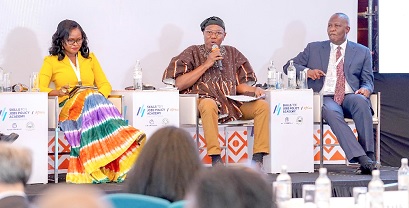Ghana urges Africa to change mindset towards TVET

The Deputy Minister of Education, Dr Clement Abas Apaak, has called on African leaders to end the long-standing perception that technical and vocational education and training (TVET) is a pathway reserved for students with weak academic abilities
Speaking at the Africa Skills for Jobs Policy Academy in Nairobi, Kenya, Dr Apaak stressed that TVET must be embraced as a first choice rather than a fallback for learners.
The Africa Skills for Jobs Policy Academy took place in Nairobi, Kenya, attended by policymakers, experts and private sector representatives to foster collaborative learning and develop reforms for Technical and Vocational Education and Training (TVET) across Sub-Saharan Africa.
The event, organised by the World Bank in partnership with the Government of Kenya and the Inter-University Council for East Africa, aims to address youth unemployment by aligning training programmes with labour market needs and promoting upskilling in key sectors.
Mindset
“There is this tendency to believe that it is students who are less competent academically who are to take up technical, vocational education and training.
“So, we have a concerted plan of action to change the mindset. And we are now saying that vocational and technical education cannot be a second option. It must be a first option,” he stated.
The Deputy Minister explained that the government was making deliberate efforts to expand access to technical institutions across the country to accommodate more students.
Within that regard, we are scaling up the number of second-cycle institutions, particularly in the area of technical institutions.
“Out of the about 900 second-cycle institutions we have in Ghana, less than 300 are technical and vocational institutions or schools,” he observed.
Apprenticeship
Dr Apaak also highlighted the government’s efforts to support young people outside formal education through the introduction of the National Apprenticeship Programme.
The initiative, he noted, was designed to cater for the millions of Ghanaian youth who were neither in school nor enrolled in any training scheme.
“But here is an important factor: the government has also introduced what we call the National Apprenticeship Programme, which has given an opportunity to about 1.5 million young people who are not in school and are not in any training, so that we can put them through competency-based training, to train them and certify them, so that we can deploy them,” he explained.
Opportunity
The World Bank and the Inter-University Council for East Africa launched the Africa Skills for Jobs Policy Academy programme, designed to boost employment opportunities on the continent.
The Vice President for Eastern and Southern Africa at the World Bank, Ndiame Diop, said in the Kenyan capital, Nairobi, that the initiative provides an opportunity for governments, the private sector and development partners to deliver practical solutions that would equip African youth with the skills needed for jobs in growth sectors.



